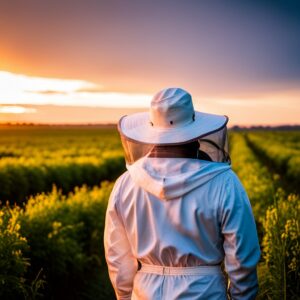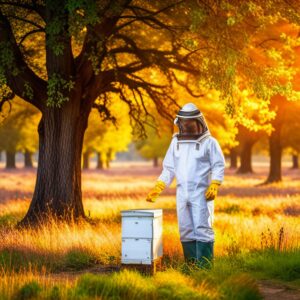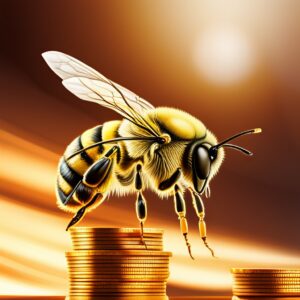Buzzing for Property Tax Savings: Beekeeping Solutions for Agricultural Exemption

Beekeeping for agricultural exemption in Texas is a practice where landowners use their property for beekeeping to qualify for a special ‘Open Space’ land valuation, reducing their property taxes. This provision is covered under Texas Tax Code Chapter 23, Subchapter D, Sect. 23.51 (1) and (2). To qualify, landowners must use their land (between 5 and 20 acres) for beekeeping for 5 out of the last 7 years. The exact requirements can vary by county, so it’s important to consult with your local county appraisal district
The Beeline to Tax Savings: Beekeeping for Agricultural Exemption in Texas
Beekeeping, also known as apiculture, is a practice that holds significant value in our ecosystem and agriculture. In the state of Texas, it also carries a unique importance in the context of agricultural exemptions. Agricultural exemptions are special provisions in the property tax law that allow landowners to have their open-space land appraised based on its agricultural use, rather than the market value. This can result in substantial tax savings for the landowner.
In recent years, beekeeping has emerged as a viable method for landowners to qualify for this agricultural exemption. This is due to the recognition of the crucial role that bees play in pollination, which is a fundamental process in the life cycle of plants and a key component of productive agriculture.
This guide aims to provide a comprehensive overview of beekeeping for agricultural exemption in Texas. We will delve into the concept of agricultural exemption, the role of beekeeping in this context, and how this all ties into the broader picture of sustainable agriculture and ecological balance. Our information and our service can help you navigate this complex process.
From Farm to Tax Form: Unpacking Agricultural Exemptions in Texas
Definition of Agricultural Exemption in Texas
In Texas, an agricultural exemption is a form of tax relief that landowners can apply for if their land is used primarily for agricultural purposes. This exemption is not an outright elimination of property taxes, but rather a reevaluation of the land’s value based on its agricultural productivity, rather than its market value. This is often referred to as an “open-space” or “ag-use” appraisal.
To qualify for this exemption, the land must have been used for agricultural purposes for at least five of the past seven years, and this use must be the land’s primary purpose. The definition of “agricultural use” is broad and includes activities such as raising livestock, growing crops, and yes, beekeeping.
Benefits and Importance of Agricultural Exemption
The benefits of an agricultural exemption are primarily financial. By having their land appraised based on agricultural use rather than market value, landowners can significantly reduce their property tax burden. This can make farming and other agricultural activities more financially viable, particularly for small-scale farmers and landowners.
But the importance of agricultural exemptions goes beyond financial considerations. By incentivizing the use of land for agricultural purposes, these exemptions also help to preserve farmland and open spaces, support local food production, and maintain the rural character and agricultural heritage of many parts of Texas.
Furthermore, by including beekeeping as a qualifying agricultural activity, these exemptions also promote the health of local ecosystems. Bees play a crucial role in pollinating many of the plants that make up these ecosystems, and their decline in recent years has been a cause for concern. By encouraging beekeeping, agricultural exemptions in Texas are also contributing to environmental sustainability.
Honey, We’re Saving on Taxes: The Role of Beekeeping for Agricultural Exemption in Texas
How Beekeeping Contributes to Agricultural Exemption
Beekeeping for agricultural exemption plays a unique and valuable role in qualifying for agricultural exemption in Texas. As per the guidelines set by the Texas Comptroller of Public Accounts, beekeeping is considered an agricultural use for the purpose of property tax appraisal. This means that landowners who maintain beehives on their property and use them for honey production or pollination can potentially qualify for agricultural exemption.
The number of hives required and the specific practices that must be followed can vary depending on the county and the size of the property. However, in general, the beekeeping activity must be conducted in a manner that is typical, common, and customary for the industry. This could include activities such as regular hive inspections, disease management, and honey harvesting.
Importance of Bees in Agriculture and the Ecosystem
Beyond their role in qualifying for agricultural exemption, bees are also vitally important to agriculture and the broader ecosystem. As pollinators, bees play a crucial role in the reproduction of many types of plants, including a significant proportion of the crops grown for human consumption. Without bees and other pollinators, our diets would be much less varied and nutritious.
In addition to their role in food production, bees also contribute to biodiversity and the health of natural ecosystems. By transferring pollen from one flower to another, bees help to ensure the genetic diversity of wild plants, which in turn supports a variety of wildlife.
In this way, beekeeping not only offers potential tax benefits for landowners in Texas, but also contributes to the health and productivity of our farms and natural landscapes. It’s a sweet deal all around.
Beyond the Honey: The Real Challenges of Beekeeping
Beekeeping, while rewarding, is not without its challenges. It requires a significant investment of time, effort, and resources. Here are some of the key difficulties you might face when considering beekeeping as a means to qualify for agricultural exemption in Texas.
High Mortality Rates
Beekeeping for ag is not just about having colonies and watching them thrive. It involves careful management and constant vigilance. According to the Bee Informed Partnership, beekeepers in the United States have been experiencing an average annual loss rate of around 40%. These losses can be attributed to various factors such as diseases, pests, poor nutrition, and exposure to pesticides, among others.
Initial and Ongoing Costs
Starting a beekeeping operation involves several costs. The initial investment includes the cost of purchasing bees, which can range from $225 to $350 per colony. Bee colonies are often not shipped almost always have to be picked up. These prices do not include the time and expense of fetching the bees. The cost of beekeeping equipment, such as hives, protective clothing, and tools, can also add up. A basic setup can cost over $500 per colony.
Moreover, there are ongoing costs to consider. These include the cost of replacing the bees that die off, feeding bees during times of nectar scarcity, and managing pests and diseases.
Working with Stinging Insects
Bees are, by nature, stinging insects. While beekeepers gradually get used to handling bees, the risk of stings, especially for those with allergies, is a constant concern. It requires learning proper handling techniques and always being cautious when interacting with the hive.
Steep Learning Curve
Beekeeping is a skill that requires knowledge in various areas including biology, ecology, and disease management. For beginners, there’s a steep learning curve. Understanding bee behavior, knowing how to manage diseases and pests, and learning how to properly care for bees throughout the seasons are all part of the beekeeper’s journey.
Other Challenges
Other challenges include time commitment, as bees require regular inspections and care, especially during the active season. Weather conditions can also impact bee health and honey production. Furthermore, beekeepers must stay updated on local laws and regulations related to beekeeping.
While beekeeping can be a fulfilling endeavor, it’s important to understand the challenges involved. It’s not a passive means to an agricultural exemption, but a hands-on practice that requires a significant commitment.
Harnessing the Hive: The Advantages of Hiring a Bee Wrangler

Beekeeping is a complex and demanding task, and for those who are not ready to take on the challenges it presents, hiring a professional professional beekeeper can be an excellent alternative. Here are some of the key benefits of hiring BeePeaceful Colony Management:
Expertise and Experience
We are professionals who have dedicated their careers to understanding and working with bees. We’ve developed the knowledge and experience to manage bee colonies effectively, ensuring their health and productivity. We understand bee behavior, can identify and treat diseases, and know how to handle bees safely.
Time and Effort
Maintaining a bee colony requires a significant time commitment. Regular hive inspections, disease management, and honey harvesting are just some of the tasks that need to be done. By hiring a bee wrangler, you can save yourself the time and effort of these tasks, allowing you to focus on other aspects of your agricultural operations.
Safety
Working with bees involves a certain level of risk, particularly for those who are allergic to bee stings. Bee wranglers have the necessary protective equipment and are trained in handling bees safely, reducing the risk of stings.
Regulatory Compliance and Insurance
We are exceptionally familiar with the local laws and appraisal district regulations related to beekeeping. We can ensure that your beekeeping operations are compliant. Additionally, our robust $2 million insurance policy provides an extra layer of security, offering you peace of mind.
Agricultural Exemption
In Texas, hiring a bee wrangler to maintain bee colonies on your land can help you qualify for an agricultural exemption, potentially saving you a significant amount in property taxes.
If you’re interested in the benefits of beekeeping but aren’t ready to take on the challenges yourself, hiring BeePeaceful Colony Management can be an excellent solution.
Your Buzzworthy Questions About Beekeeping for Agricultural Exemption in Texas Answered
What is an agricultural exemption?
An agricultural exemption is a form of tax relief that allows landowners to have their land appraised based on its agricultural use, rather than its market value. It’s also known as agricultural valuation, agricultural apprasisal and open space appraisal.
How can beekeeping qualify for an agricultural exemption in Texas?
Beekeeping is considered an agricultural use for the purpose of property tax appraisal in Texas. Landowners who maintain beehives on their property for honey production or pollination can potentially qualify for this exemption.
What are the requirements for beekeeping to qualify for an agricultural exemption?
The specific requirements can vary by county, but generally, the beekeeping activity must be conducted in a manner that is typical, common, and customary for the area.
How many hives do I need to qualify for the exemption?
The number of hives required can vary depending on the size of the property and the county’s guidelines. Most counties in Texas require at least six colonies.
Is a hive the same as a colony?
Yes, but a hive is often used to include the box and bees and a colony often describes just the bees.
How large is a hive? How much space is needed for 6 colonies?
A hive box is 11 inches tall and is 20 inches long by 16 inches wide. 6 colonies easily fit in an area that is 10 feet long and 5 feet wide. We almost always place the colonies together in one small area.
What are the benefits of an agricultural exemption?
The primary benefit is financial, as it can significantly reduce a landowner’s property tax burden. It also helps to preserve farmland, support local food production, and contribute to environmental sustainability.
What are the challenges of beekeeping for agricultural exemption?
Beekeeping requires a significant investment of time, effort, and resources. Challenges include high bee mortality rates, initial and ongoing costs, working with stinging insects, and a steep learning curve.
Can I hire someone to manage the bees for me?
Yes, hiring a professional bee wrangler like BeePeaceful Colony Management is an option for those who don’t have the time or energy to take on the challenges of beekeeping themselves.
We also have a frequently asked questions about agricultural exemption in Texas page.
Getting Started with Beekeeping
Embarking on the journey of beekeeping for agricultural exemption can seem daunting, but with the right guidance and support, it can be a rewarding and fruitful endeavor. Here’s a step-by-step guide on how to get started with our beekeeping services:
Step 1: Schedule a Consultation
Your journey begins with a simple step: scheduling a consultation with us. During this consultation, we’ll discuss your needs, answer any questions you might have, and provide you with detailed information about our services. This is a great opportunity for us to understand your goals and for you to learn more about the process.
Step 2: Site Evaluation
Next, we’ll conduct a site evaluation of your property. This will help us determine the best location for your hives, taking into consideration factors such as sunlight, wind direction, and proximity to water sources and flowering plants. We need to drive next to the hives in order to feed and treat them. We place them away from the street and away from homes.
Step 3: Hive Installation
Once we’ve identified the ideal location, we’ll proceed with the installation of the hives. Our team will ensure that the hives are set up correctly and safely, ready for the arrival of the bees.
Step 4: Bee Installation
The next step is the introduction of the bees into their new home. We’ll carefully install the bees into the hives, ensuring they are comfortable and ready to start their important work.
Step 5: Regular Maintenance and Inspections
Beekeeping requires regular maintenance and inspections to ensure the health and productivity of the bees. Our team will handle this for you, visiting your property on a regular basis to inspect the hives, manage any pests or diseases, feed the bees and manage their population.
Step 6: Enjoy the Benefits
With the hives installed and the bees at work, you can start enjoying the benefits of beekeeping. Not only will you be contributing to the health of the local ecosystem, but you’ll also be taking a significant step towards beekeeping for an agricultural exemption on your property taxes.
Ready to get started? Schedule a Consultation with us today and let’s embark on this beekeeping journey together.
